
Rechtsmedizin
metrics 2024
Catalyzing Insights in Forensic Research
Introduction
Rechtsmedizin is a prestigious academic journal published by Springer, focusing on the critical field of forensic medicine and pathology. With a legacy dating back to 1995, this journal serves as a vital platform for disseminating advanced research and clinical findings that enhance the understanding of legal medicine and forensic science. Although it currently does not offer open access, it boasts an impressive Q3 ranking in 2023 within its category, indicative of its contribution to the field, with a Scopus rank of #149 out of 208 in Medicine, placing it within the 28th percentile of its peers. As a dedicated resource for researchers, professionals, and students, Rechtsmedizin aims to bridge the gap between clinical practice and forensic investigation, promoting the integration of scientific advancements into everyday applications within the legal context. With its location in New York City, USA, the journal remains a key player in the global discourse on forensic issues, thus inviting submissions that push the boundaries of traditional forensic methodologies and explore innovative approaches in legal medicine.
Metrics 2024
 0.28
0.28 0.40
0.40 0.40
0.40 24
24Metrics History
Rank 2024
Scopus
IF (Web Of Science)
JCI (Web Of Science)
Quartile History
Similar Journals
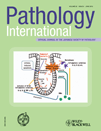
PATHOLOGY INTERNATIONAL
Empowering Clinicians and Researchers with Cutting-Edge KnowledgePATHOLOGY INTERNATIONAL, published by WILEY, stands as a distinguished journal in the field of pathology and forensic medicine, serving as an essential resource for researchers, clinicians, and students alike. With its ISSN 1320-5463 and E-ISSN 1440-1827, PATHOLOGY INTERNATIONAL has established itself since its inception in 1951, navigating through an evolving landscape in medical science with insights and breakthroughs up to 2024. It holds a commendable Q2 ranking in both the Medicine (miscellaneous) and Pathology and Forensic Medicine categories, indicating its robust influence and quality within these fields, as evidenced by its placement in the 70th percentile of Scopus rankings. While currently not an open-access journal, it provides access options that ensure valuable research remains available to the academic community. PATHOLOGY INTERNATIONAL commits to advancing the discipline through pioneering research articles, comprehensive reviews, and expert opinions that push the boundaries of understanding in pathology, thereby supporting the enhancement of diagnostic and therapeutic practices.
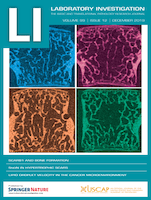
LABORATORY INVESTIGATION
Driving Excellence in Scientific Research and DiscourseLaboratory Investigation is a premier academic journal published by Elsevier Science Inc, specializing in the fields of Pathology, Forensic Medicine, Cell Biology, and Molecular Biology. With its ISSN 0023-6837 and E-ISSN 1530-0307, this journal has been a significant contributor to scientific discourse since its inception in 1952, converging into its current form by 2024. It holds an impressive standing in its respective fields, featuring a 2023 Journal Rank of Q2 in both Cell Biology and Molecular Biology, and an elite Q1 ranking in Pathology and Forensic Medicine, reflecting its influence and quality of research, as seen in its Scopus ranks—17th out of 208 in Pathology and Forensic Medicine. Although it does not offer Open Access options, the journal remains a vital resource for researchers, professionals, and students who seek to disseminate and engage with high-caliber research findings. The importance of Laboratory Investigation is underscored by its commitment to advancing the understanding of laboratory and translational medicine, paving the way for innovations that enhance clinical practices.
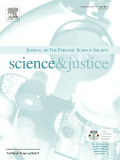
SCIENCE & JUSTICE
Empowering Justice Through Scientific Inquiry.Science & Justice is a leading international journal published by Elsevier Science Ltd, dedicated to the interdisciplinary examination of the intersection of justice and science, especially within the realms of forensic science and pathology. Established in 1995, this reputable journal has garnered a commendable Q2 rank in the category of Pathology and Forensic Medicine, reflecting its significant contributions to advancing knowledge in these critical fields. With an ISSN of 1355-0306 and an E-ISSN of 1876-4452, the journal is indexed in Scopus, positioning it in the top 68th percentile among its peers. The objectives of Science & Justice include promoting research that bridges scientific methodologies with justice-related applications, making it an invaluable resource for researchers, professionals, and students alike. As the journal continues to evolve, it aims to interface scientific innovations with forensic practices, thereby enhancing the integrity of justice processes globally. Despite not offering Open Access options, it remains a pivotal reference point within the academic community focused on forensic science methodologies and their legal implications.
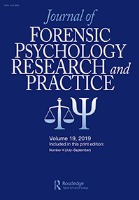
Journal of Forensic Psychology Research and Practice
Innovating Research for Real-World Forensic Applications.Journal of Forensic Psychology Research and Practice is a distinguished publication within the fields of Applied Psychology and Pathology and Forensic Medicine, published by Routledge Journals, Taylor & Francis Ltd. With a commitment to advancing knowledge from 2017 to 2024, this journal aims to bridge theory and practice by showcasing empirical research, including case studies and innovative methodologies, that address the complexities of forensic psychology in contemporary settings. While it holds a respectable Q3 ranking in both Applied Psychology and Pathology and Forensic Medicine, making it a vital resource for scholars and practitioners alike, its insights contribute significantly to understanding the psychological aspects of criminal behavior and legal processes. Researchers, professionals, and students are encouraged to engage with its content to further their understanding and application of forensic psychology principles in real-world scenarios.

MEDICINE SCIENCE AND THE LAW
Bridging the Gap Between Health Policy and Legal FrameworksMEDICINE SCIENCE AND THE LAW is a prestigious journal published by SAGE PUBLICATIONS INC, focused on the intersection of law, health policy, and ethical issues as they pertain to medicine. With a long-standing history dating back to 1960, this journal has become a crucial platform for scholars and professionals alike to share and disseminate research that shapes the evolving legal landscape surrounding health care practices. It holds notable positions in the academic community, ranking in the Q3 category for Health Policy and Issues, Ethics and Legal Aspects, and achieving a distinguished Q1 ranking in Law as of 2023. With rigorous peer-review standards and a commitment to publishing high-quality research, MEDICINE SCIENCE AND THE LAW is invaluable for those exploring the critical legal challenges and ethical dilemmas faced within the healthcare sector. Research contributions are vital for informing policy and practice, ensuring that the journal remains a relevant and essential resource for researchers, practitioners, and students dedicated to the intersection of law and medicine.
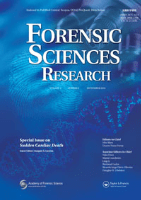
Forensic Sciences Research
Bridging Disciplines in Forensic InquiryForensic Sciences Research is a distinguished open-access journal published by Oxford University Press, dedicated to the interdisciplinary field of forensic sciences. Since its inception in 2016, the journal has rapidly established itself as a vital resource for researchers, professionals, and students in areas including analytical chemistry, anthropology, biochemistry, genetic studies, and various branches of forensic medicine. With an impressive range of impact factor metrics across multiple categories—including Q1 rankings in Anthropology for 2023—this journal provides unparalleled access to high-quality research while facilitating the dissemination of innovative ideas and methodologies in forensic science. Researchers benefit from the journal's extensive Scopus ranking, which showcases its influential position within the academic community. The open-access model allows global accessibility, ensuring that vital forensic research reaches a diverse audience and contributes to advancements in public safety and legal processes. For those engaged in the practical realities of forensic investigation or the theoretical underpinnings of the field, Forensic Sciences Research is an indispensable journal that continues to advance knowledge and foster collaboration within the forensic community.

Pathologie
Enhancing Clinical Outcomes Through Cutting-Edge PathologyPathologie is a distinguished academic journal published by Springer Heidelberg, dedicated to advancing the field of pathology and forensic medicine. With an ISSN of 2731-7188 and an E-ISSN of 2731-7196, this journal serves as a vital platform for researchers, professionals, and students to disseminate innovative findings and insights. Currently ranked in the Q3 category of pathology and forensic medicine according to the 2023 metrics, Pathologie reflects a commitment to quality and relevance in a dynamic research landscape. Despite its relatively recent establishment from 2022, the journal is gaining traction with a Scopus rank of 139 out of 208 in its category, positioning itself as an emerging resource within the academic community. While it operates under a subscription model, the importance of the journal lies in its objective to facilitate the exploration of diverse pathological processes and enhance forensic methodologies, ultimately improving clinical outcomes and investigative practices. As it continues to grow, Pathologie stands poised to impact the pathology domain significantly.

Egyptian Journal of Forensic Sciences
Elevating forensic sciences through scholarly excellence.The Egyptian Journal of Forensic Sciences, published by the International Association of Law & Forensic Sciences, stands as a premier platform for scholarly communication in the fields of forensic science, law, and health-related social sciences. With an ISSN of 2090-536X and an E-ISSN of 2090-5939, this open-access journal, established in 2011, has garnered a reputation for its rigorous peer-review process and substantive contributions to the field. Housed in Switzerland, it boasts impressive metrics, achieving a Q2 ranking in Health (social science) and a stellar Q1 in Law, in addition to being recognized in Pathology and Forensic Medicine. With its articles accessible to a global audience, the journal encourages the exchange of innovative ideas and practices among researchers, professionals, and students who are dedicated to advancing the disciplines of forensic science and legal studies. As of 2023, it ranks in the 75th percentile in Social Sciences - Law and continues to influence both academic discourse and practical applications in the forensic domain.
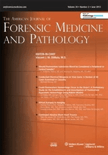
AMERICAN JOURNAL OF FORENSIC MEDICINE AND PATHOLOGY
Bridging Medicine and Justice in Forensic ScienceThe American Journal of Forensic Medicine and Pathology is a pivotal publication within the field of forensic science and pathology, dedicated to disseminating influential research and advancements in the evaluation of death and injury in legal contexts. Published by Lippincott Williams & Wilkins, this journal, which has been in circulation since 1980, serves as a vital resource for professionals, researchers, and students focused on intersecting disciplines such as medicine and forensic investigations. While it holds a respectable Q3 ranking in both the Medicine (Miscellaneous) and Pathology and Forensic Medicine categories as of 2023, the journal's impact is underscored by its contributions to the ongoing dialogue on forensic practices and methodologies. The American Journal of Forensic Medicine and Pathology provides a platform for innovative papers that shape the future of forensic science, also offering insights through case studies, reviews, and research articles that cater to its diverse readership. With an ISSN of 0195-7910 and E-ISSN 1533-404X, the journal continues to support the scholarly community in advancing knowledge within this critical field.

Anil Aggrawals Internet Journal of Forensic Medicine and Toxicology
Championing Diverse Voices in Forensic ResearchAnil Aggrawals Internet Journal of Forensic Medicine and Toxicology, an esteemed publication in the field of forensic medicine and toxicology, is dedicated to disseminating innovative research and critical insights since 2000. Published by ANIL AGGRAWALS INTERNET JOURNAL FORENSIC MEDICINE & TOXICOLOGY, the journal caters to professionals, researchers, and students keen on advancing their understanding of forensic science, including its intersections with law and public health. Although it currently holds a Q4 quartile ranking in Law, Pathology and Forensic Medicine, and Toxicology, the journal provides a vital platform for underrepresented studies, encouraging a diverse range of scholarly contributions. With its open access model, the journal enhances visibility and accessibility, ensuring that valuable research can reach a wider audience. As the journal continues to evolve, it plays a crucial role in bridging theoretical knowledge and practical applications, thereby enriching the discourse within its fields of study and fostering inter-disciplinary collaborations.